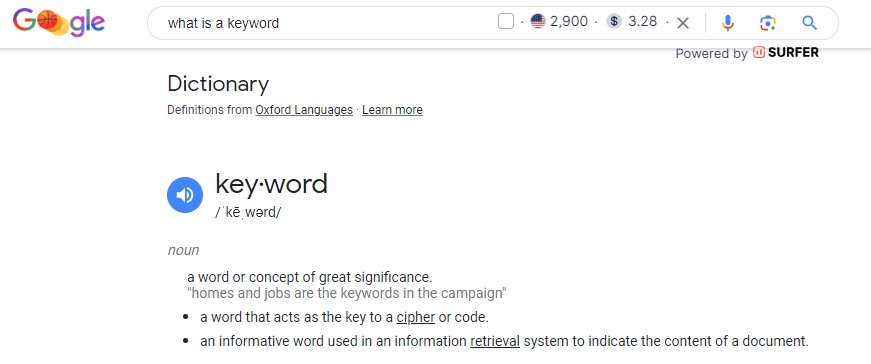In the vast ocean of digital content, the strategic use of keywords is essential for anyone looking to improve their online presence. Keywords are not just about SEO; they are about connecting with your audience and answering their questions.
This guide will walk you through everything from the basics of keyword research to advanced strategies for integrating keywords into your content.

Understanding Keywords
Definition of Keywords
Keywords are specific phrases or terms that define the content on a webpage. They are the bridge between what people are searching for and the content you provide to meet that need.
Types of Keywords
- Short-tail keywords: These are broad and often consist of one to three words. They generate high traffic but are highly competitive.
- Long-tail keywords: Longer and more specific, these keywords are less competitive and can drive more qualified traffic.
Importance of Keywords in SEO
Keywords are fundamental to SEO as they help search engines understand the content of a page, making it easier to match with relevant searches.
Keyword Research
Tools for Keyword Research
- Google Keyword Planner: This tool is designed to help you find keywords related to your business and see how they might perform.
- SEMrush: Provides detailed insights into the SEO strategies of competing websites, including the key terms they rank for.
Analyzing Keyword Relevance
Identifying key phrase that are relevant to your content is crucial. The more relevant your keywords, the better your content will satisfy user intent and rank in search results.
Understanding Keyword Difficulty
Keyword difficulty indicates how hard it will be to rank for a specific keyword. Tools like Moz and Ahrefs provide a keyword difficulty score which can help you choose your battles wisely.
Strategies for Keyword Usage
Keyword Density: Striking the Balance
Keyword density refers to the number of times a keyword appears in your content, relative to the total word count. An ideal keyword density is about 1-2%, ensuring your content does not suffer from keyword stuffing.
Placement of Keywords
- Introduction: Early placement helps search engines understand the relevance of your content.
- Headings: Incorporating keywords into headings helps to organize your content and improve SEO.
- Conclusion: Sum up the content and reinforce your key phrase, improving recall and relevance.
LSI Keywords and Their Importance
Latent Semantic Indexing (LSI) keywords are thematically related terms that search engines use to understand context. Including LSI keywords can help improve the search relevancy of your content.
Keywords in Content Optimization
Creating Quality Content
Quality content meets the needs of your audience and encourages them to engage with your site. It must be informative, easy to read, and relevant to the keywords you target.
On-Page SEO Techniques
- Meta descriptions: Though not a ranking factor, they influence click-through rates.
- Alt texts: Provide descriptions for images, improving accessibility and SEO.
The Role of Keywords in User Experience
Keywords should enhance the user experience by making it easier for users to navigate your content and find the information they need.

SEO and Keywords
How Keywords Affect Your SEO
Properly chosen and well-placed key phrase help search engines understand and rank your content, increasing your visibility.
Monitoring Keyword Performance
Use tools like Google Analytics and Ahrefs to track how well your keywords are performing and how they are contributing to your traffic.
Adjusting Your Strategy Based on Analytics
Analytics can show you which keywords are working and which aren’t, helping you refine your strategy over time.
Tools and Techniques
SEO Tools Overview
- Ahrefs: Excellent for tracking keyword rankings and site audits.
- Moz: Known for its domain authority metric and keyword recommendations.
Keyword Integration Tools
Using tools like Yoast SEO can help ensure that your keywords are properly placed and that your content is optimized for search engines.
Advanced Techniques for Keyword Optimization
Experiment with different keyword integration strategies, such as using synonyms and related phrases, to see what yields the best results.
Avoiding Keyword Stuffing
The Dangers of Over-Optimization
Excessive use of keywords can lead to penalties from search engines, which detract from your content’s readability and user experience.
Signs of Keyword Stuffing
Repetition of the same phrases or keywords in a way that feels unnatural or forced is a key indicator of keyword stuffing.
How to Avoid Keyword Stuffing
Focus on creating natural, engaging content. Use key phrase thoughtfully and sparingly, ensuring they enhance rather than detract from your content.
Case Studies
Successful Keyword Usage
Examine case studies where effective keyword strategies have led to significant improvements in traffic and rankings.
Common Mistakes
Learn from others’ errors to avoid common pitfalls in keyword usage, such as targeting too broad or irrelevant keywords.
Lessons Learned
Summarize key lessons from various case studies and industry experts to form best practices in keyword usage.

FAQs
How often should I review my keyword strategy?
It’s best to review and adjust your keyword strategy quarterly to adapt to changes in search trends and performance metrics.
What is the ideal keyword density?
Aim for 1-2% within your content to balance readability with SEO.
How do I choose the right keywords?
Focus on keywords that are relevant to your content and have a good balance of search volume and competition.
Can I use the same key phrase on all pages?
It’s better to target different keywords on different pages to cover a broader range of search queries.
What are the best tools for keyword tracking?
Google Search Console and Ahrefs are great tools for tracking how your keywords perform over time.
Conclusion
Using keywords effectively is not just about improving search engine rankings; it’s about creating content that resonates with your audience. By understanding the best practices in keyword research, placement, and optimization, you can create content that not only ranks well but also fulfills the needs of your readers.
Imtiaz is a seasoned Web Development & SEO Specialist, serving as the CEO of Innoovate. With a passion for crafting engaging online experiences, he combines technical expertise with creative vision to drive digital success.
Ready to boost your business?
Get a FREE quote from Innoovate! We do websites, SEO, social media, design, and lead generation. Let's make your business awesome!
Request a free quote
Ready to grow your business? Get a FREE quote from Innoovate! We help with websites, SEO, social media, design, and getting more leads. Let's make your business even better together!
Subscribe to our newsletter!
More from our blog
See all postsRecent Posts
- How to Choose the Best Web Design Company in Dubai June 6, 2024
- Website Development Partner: Finding the Right One May 24, 2024
- 5 Best Website Builders for Accountants May 22, 2024









